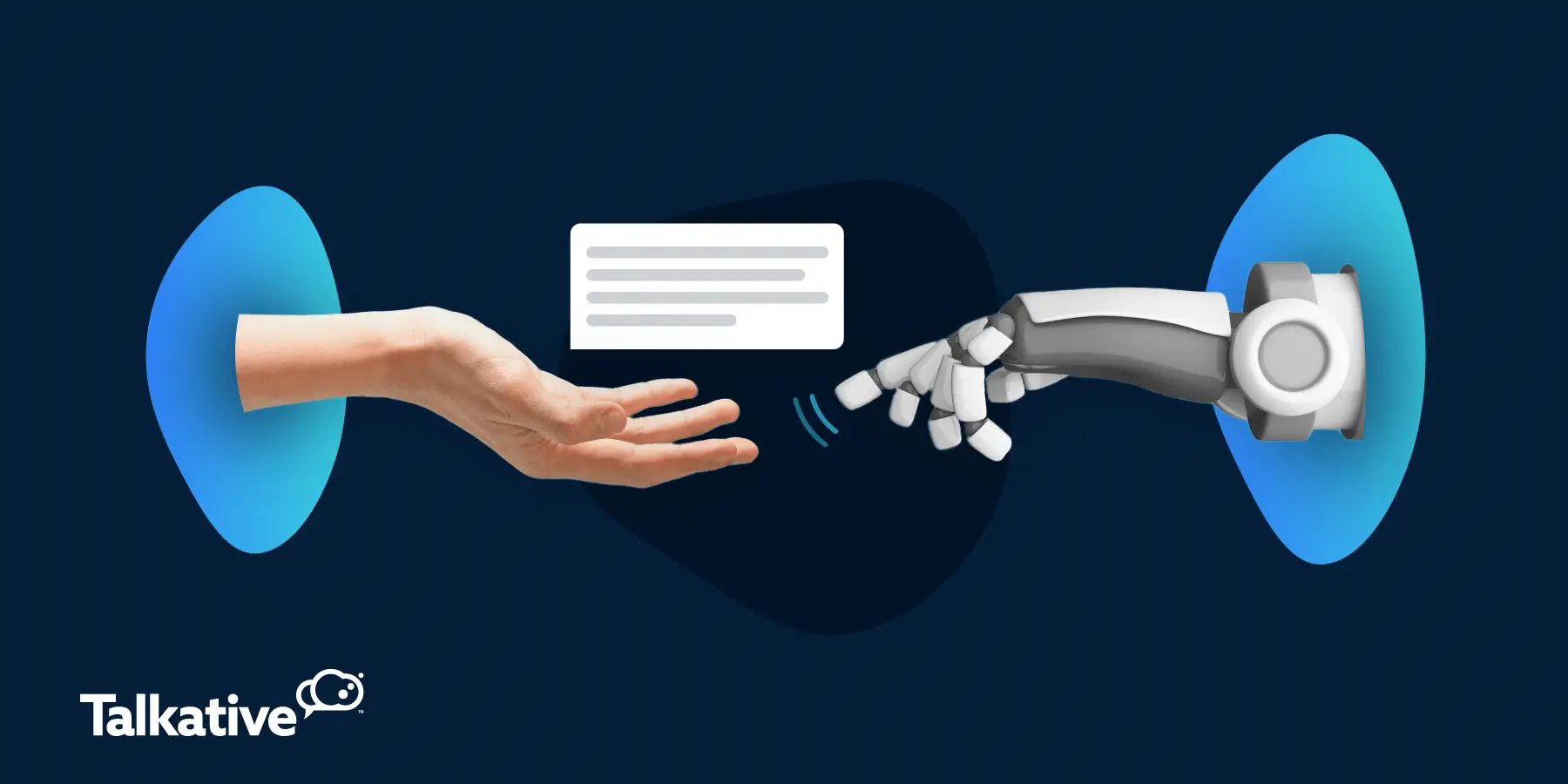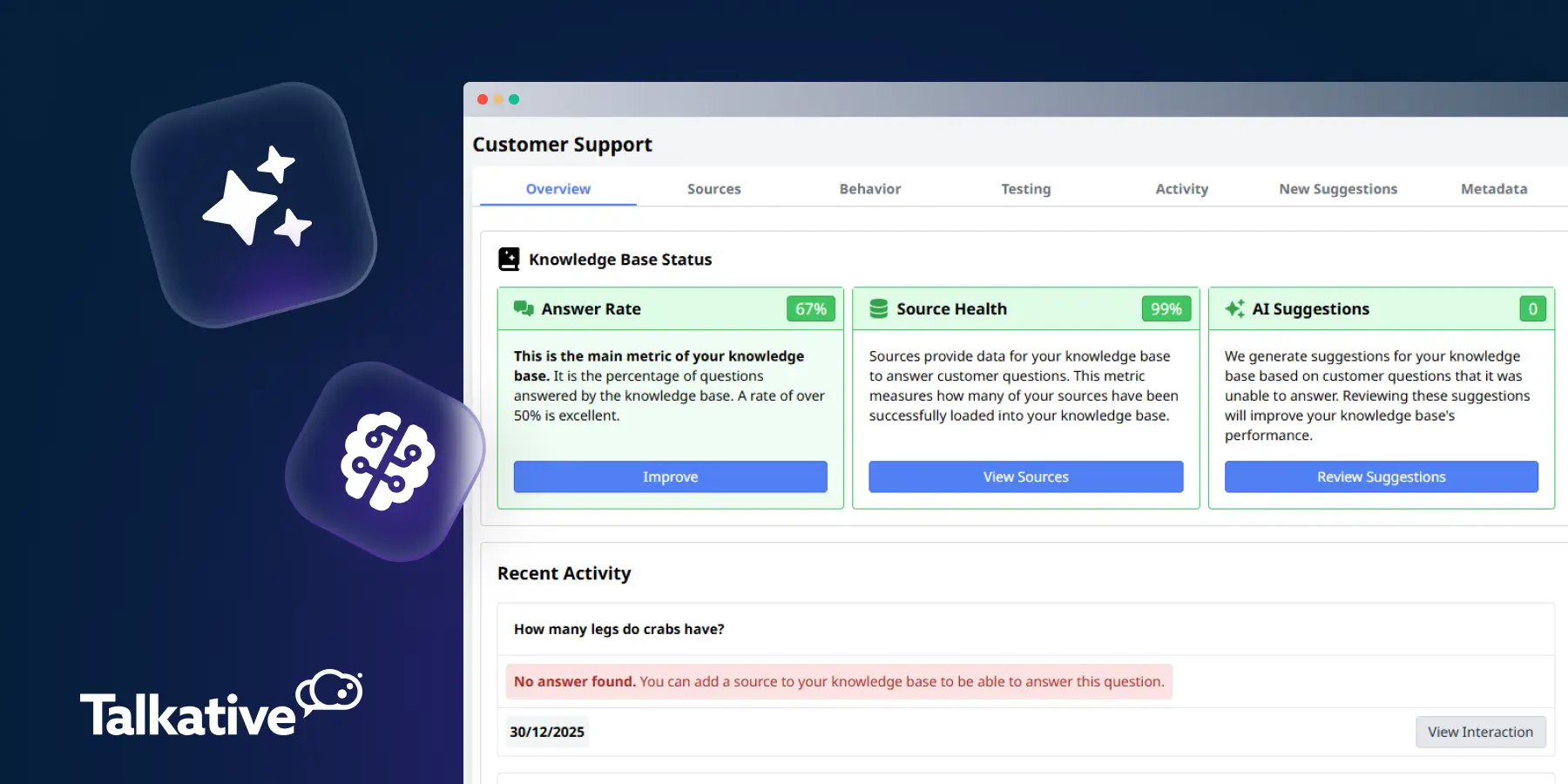Whether you’re excited or sceptical about the rise of artificial intelligence (AI), there’s no denying it’s transforming businesses and CX.
In fact, 83% of companies report that AI advancements are a top priority for their business strategy.
When used effectively, AI solutions can help businesses and contact centres become more efficient, cost-effective, and productive.
They can also augment customer support by making service faster, highly accurate, and more accessible.
One example of these emerging technologies is the AI knowledge base.
With a strong knowledge base, businesses can optimise AI performance and accuracy, delivering an improved and more consistent customer experience.
In this article, we’ll explore how this works. We’ll cover:
- What is a knowledge base?
- What is a knowledge base for AI, and how does it work?
- How to use an AI-powered knowledge base for customer support (top tips)
TL;DR
A knowledge base for AI is a repository of company information that’s integrated with AI solutions (e.g. chatbots, voicebots). How to use an AI-powered knowledge base for customer support:
- Select knowledge base content: Populate your knowledge base with comprehensive content (i.e. everything the AI needs to know about your business), including FAQs, product and service details, troubleshooting guides, business policies, brand guidelines, etc.
- Leveraging AI chatbots & voicebots: Integrate customer service AI chatbots and voicebots with your knowledge base to ensure AI accuracy.
- Use across channels: Use AI knowledge base across voice, chat, and messaging support channels.
- Customer feedback: Collect feedback after user interactions for continuous improvement. Implement feedback forms that customers can submit to help you evaluate AI performance and enhance the knowledge base.
- Regular maintenance: Update and maintain knowledge base content regularly for accuracy. Conduct audits, monitor queries, use analytics/reporting, and involve your support team to fill information gaps.

What is a knowledge base?
A traditional knowledge base is a comprehensive database of information that serves as a resource for customers and employees.
It's typically a centralised hub of content in the form of articles, guides, FAQs, and troubleshooting resources.
Imagine it as a virtual encyclopaedia tailored to your specific organisation - including your branding, products/services, company policies, processes, etc.
For customers, a knowledge base can serve as a self-help trove, offering instant access to help and solutions without the need for human assistance.
For support teams, knowledge bases provide a database of information, helping agents find answers and solutions for customer queries.

What is a knowledge base for AI?
An AI knowledge base is also a repository of company information - but one that’s integrated with AI solutions.
By leveraging a knowledge base, AI agents (i.e. chatbots and voicebots) can:
- Process and understand the knowledge base content
- Retrieve relevant information for agents and customers
- Interpret customer questions and generate accurate, on-brand responses
- Answer and automate a wide variety of inquiries
This takes the power of a knowledge base to the next level, turning what was once just a collection of information into an intelligent tool that can actively assist customers and agents.

How to use knowledge bases for AI customer support
Now that we’ve covered the basics of knowledge bases, let’s dive into the top tips for using them to enhance AI customer service.
1. Ensure comprehensive knowledge base content
The effectiveness of an AI bot is determined largely by the infomation put into it - so it’s crucial that you build a knowledge base using a variety of relevant content.
Remember that the knowledge base for an AI system needs to include everything you want the AI to know about your business.
What’s included in a knowledge base for AI might vary depending on your industry, but the following components are a good place to start:
- Frequently Asked Questions (FAQs): Compile a comprehensive list of common customer questions and their answers. This helps the AI provide quick responses to repetitive queries/issues.
- Product/service information: Include detailed resources covering everything customers and agents might need to know about your products/services. This should cover features, specifications, updates, usage instructions, user manuals, how-to guides, and any other relevant details.
- Troubleshooting guides: Provide step-by-step guides or support articles for troubleshooting problems that are encountered frequently.
- Technical documentation: For more complex products or services, you should include technical support documentation that delves deeper into specifications, configurations, and advanced troubleshooting.
- Policies & procedures: Document your company policies, warranty information, return/exchange policies, customer support processes, and any other procedures that customers or agents may need to know.
- Multimedia content: In addition to text-based content, you might want to include images, videos, or other visual elements within your knowledge base. Visual aids can be particularly helpful for explaining complicated solutions or information.
- Website content: Some AI-powered knowledge bases allow you to input information directly from your business website. With Talkative, for example, you can do this by simply scarping your site or copying and pasting URLs (you can also upload file-based content). From there, the system can learn from your website content and branding, plus any other knowledge base resources you import.
By incorporating all these elements into your AI knowledge base, you’ll create an extensive and effective resource that can provide the support your customers and agents need.

2. Use the knowledge base to help agents as well as customers
It’s not just customers that can benefit from AI knowledge base tools (i.e. chatbots, voicebots).
This technology can also be used to provide agents with real-time assistance, guidance, and recommendations during customer interactions.
For example, with Talkative, you can use your knowledge bases to power...
- AI Response Suggestions: AI response suggestions can transform the way agents answer customer queries during live conversations. The AI uses your knowledge base datasets and the interaction context to generate relevant response suggestions for each customer message. Agents can choose to instantly send the suggestion back to the customer or edit it themselves before sending it.
- AI Agent Copilot: The above AI Knowledge Base responses are one component of our AI Agent Copilot suite. Powered by generative AI and your knowledge base datasets, Agent Copilot is a set of AI tools designed to improve response speed and quality. In addition to response suggestions, this feature also provides 'Navi', an internal-facing chatbot that acts as a personal AI assistant for agents, and an AI Autocomplete capability that can predict and complete agent messages.
AI knowledge base tools like these help empower your agents to perform better and faster while increasing their productivity and efficiency.

3. Utilise customer feedback
Customer feedback is a goldmine of insights that can fuel continuous improvement for both your AI knowledge base and customer service processes.
The best way to collect feedback is to ask for it after a customer has used your AI chatbot or voicebot for support.
For instance, with Talkative, you can design a custom feedback form that appears automatically at the end of every AI chatbot interaction.
This will allow customers to rate and review the service provided by your AI bot, giving you valuable insights into the service quality and outputs your AI knowledge base is providing.
In turn, you can use these insights to uncover customer perceptions and make targeted improvements to your AI knowledge base and its contents.

4. Continuously maintain & update
Maintaining your AI knowledge base with content updates is an ongoing commitment - and it's an essential practice for long-term success.
If you fail to keep your knowledge base up-to-date, the AI’s performance could suffer, and it may produce inaccurate outputs.
So, be sure to regularly audit and update your knowledge base content to reflect any changes in products, services, branding, policies, or industry standards.
It’s also important to review customer queries and AI responses so you can identify any information gaps in your knowledge base that need to be covered.
With Talkative, you can do these practices faster and more easily with AI analytics, reporting, and insights, plus our Knowledge Base User Interface that puts everything you need for knowledge base management into one place.
You can also encourage your customer support teams to contribute to this process, based on their interactions with customers and the issues they encounter regularly.
By keeping your AI knowledge base well-maintained and up-to-date, you’ll ensure it remains a valuable resource for customer support that helps rather than hinders.

Benefits of integrating AI systems with an AI knowledge base
By implementing and using an AI knowledge base effectively (with the help of the above tactics), you can achieve the following outcomes…
Improved customer self-service
Many of today’s consumers want the option to help themselves with their queries.
Case in point, 40% of customers prefer self-service over human intervention, and 81% say they want businesses to increase their self-service offerings.
By integrating your AI-powered knowledge base with a chatbot and/or voicebot, you’ll create an advanced self-service tool that customers can use to get lightning-fast answers and solutions.
These systems can even provide links to relevant support articles and resources, making your knowledge base content more accessible to consumers.
By improving self-service with AI that's grounded in company knowledge, you’ll empower customers to resolve more issues independently - leading to a better digital customer experience and a reduced workload for your agents.

Empowered support agents
AI knowledge bases don’t just help customers - they can also empower your agents to perform better.
In fact, one study found that customer support agents who use AI can handle 14% more queries per hour, compared to those not using AI assistance.
With tools like AI Copilot, agents can quickly access relevant information directly from the knowledge base, improving average response time and facilitating faster resolutions.
Plus, AI bots automating more user interactions means the demand on your agents will decrease.

Optimal efficiency & performance
With an AI automating more customer support reuqests and boosting agent productivity, you’ll likely see improved efficiency and performance over time.
By integrating AI agents with your knowledge base, you can boost efficiency and performance through:
- Shorter handling times
- Faster responses & resolutions
- Higher chance of a first-contact resolution
- More advanced automated customer service (and self-service)
- Better technology and information access for agents

The takeaway: Enhancing your knowledge management system with AI
A knowledge base can be a real force multiplier for AI customer support, but only if it’s built on comprehensive, well-organised content and kept continuously up to date.
When you combine a strong knowledge base with AI across channels, you unlock faster resolutions, more consistent answers, and better self-service for customers.
You'll also give agents the guidance and information they need to work more efficiently.
Want to learn more about how Talkative can help you power chatbots, voicebots, agent copilot tools, and more with an AI knowledge base?
Get in touch with us, or check out our knowledge base support guide.



